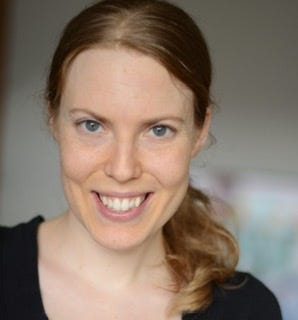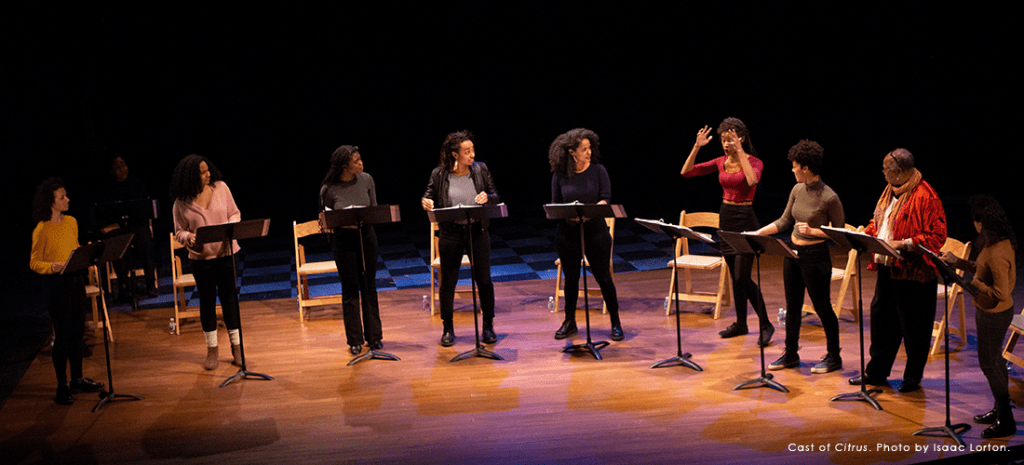Self-driving trucks, questions of family history, high-schoolers vying to win a National Shakespeare Competition. Northern Stage’s New Works Now, the annual (now virtual) festival of works-in-progress, is ready to launch three new staged readings beginning with Drive on Saturday, January 16 at 7:30 p.m.
I caught up with Drive’s creator, award-winning playwright Deborah Yarchun, with questions about the play itself, and also about what staged readings mean for writers and audience members. What follows is a minimally edited (because I found Yarchun’s answers—framed in blue, below—so compelling in their original form) version of our interchange.
1. Can you give a thumbnail sketch of the play’s plot and/or theme?
Drive explores characters who are suddenly out of work and forced to confront a new reality and reexamine their identities. It’s taken on a deeper relevance than I had anticipated during the pandemic.
This is how I've been describing the play. A community of truckers in a small town in Iowa are forced to shift gears when they lose their jobs to self-driving vehicles. When Gloria becomes the only trucker in town still employed, resentments begin to surface. Tensions escalate as they grapple with a mystery: Haygen, a driver with close ties to all of them, has disappeared. Set in a future not far down the road, Drive explores our collective fears surrounding the next stage of automation and what happens when individuals in a country where we’re so defined by our work are forced to reevaluate what drives them.
2. I happen to like staged readings, and would like to give readers a better understanding of the role they play in a work’s creation. As a playwright, could you comment on whether, how and why staged readings help you to develop a work like Drive?
I find staged readings very helpful as a playwright. A play is really just a blueprint. It takes actors to embody the characters you created. Sometimes something may seem great on the page and you learn from hearing it read out loud that it doesn’t actually work. Or the rhythm is wrong . . . [T]he director and actors often ask insightful, illuminating questions that can lead to revisions and new ways of seeing a scene or a character. And of course, the audience’s response to the play—where they laugh, lean forward, or seem checked out—is often very telling for what’s working and what’s not.
3. This is not the first staged reading of Drive. In order to give potential viewers an understanding of how their feedback might be received, is there an example you could share of a viewer’s comment that you actually incorporated into a revision of the play?
Feedback from audiences has been very helpful in shaping Drive. During a post-show discussion at an earlier reading of the play at Martha’s Vineyard Playhouse, it became clear the audience didn’t fully understand the impact of Haygen (an offstage character) on the other characters. This was a problem because Haygen’s disappearance is a core element of the play. During the play’s next workshop (through Dartmouth’s VoxFest), I focused on making sure Haygen was not only vivid but that his ties to each character and his importance to them were clear. I think these revisions—which started with an audience member’s question—really clarified the story and made the play more visceral.
4. What was your impetus in writing Drive? It seems so timely in an age when artificial intelligence is causing anxiety on many levels, including the loss of jobs.
I’ve long been fascinated by truck drivers and what their lives are like. I’ve also over the past few years become both fascinated and terrified by artificial intelligence and automation and how it’s going to affect society. The idea of truck drivers losing their jobs to self-driving trucks was the perfect vehicle (pun intended) to explore how AI and automation could affect our lives.
In addition to Drive, New Works Now includes readings of two other plays. Enough (January 23 at 7:30 pm) is by Celeste Jennings, who explores issues of self-definition and its relationship to family history. Her earlier work, the choreopoem Citrus, began at New Works Now 2019 (photo, above) and was fully staged at Northern Stage in 2020 (previewed here for The Arts Fuse.) Shook, book by Alexis Scheer, music and lyrics by Zoe Sarnak, (January 30 at 7:30 pm) is an exciting experience for Northern Stage and its audience—its very-first commissioned musical work, funded by the Helen Gurley Brown Foundation.
All readings will take place via Zoom, and are free of charge ($10 suggested donation). To reserve your place for any or all of the three plays, and for more information about the works and their respective creative teams, click here.
————————————
Welcome! You’re reading Artful, a blog about arts and culture in the Upper Valley, and I hope you’ll subscribe and then share this with your friends and on your social media. And in case you are wondering . . .
Susan B. Apel shuttered a lifelong career as a law professor to continue an interest (since kindergarten) in writing. Her freelance business, The Next Word, includes literary and feature writing; her work has appeared in a variety of lit mags and other publications including Art New England, The Woven Tale Press, The Arts Fuse, and Persimmon Tree. She connects with her neighbors through Artful, her blog about arts and culture in the Upper Valley. She’s in love with the written word.





